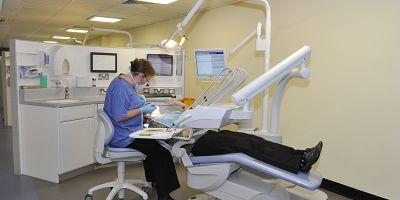The curriculum
Reflective learning is essential throughout the programme, particularly in areas of clinical practice.

The curriculum is broadly split into four themes which form the core of education, and are expanded upon as knowledge and skills progress.
These themes are:
- Health and Disease
- Clinical Practice
- Personal and Professional Development
- Preparation for Practice
Throughout the entire programme, reflective learning is essential, particularly in areas of clinical practice.
You will build a personal portfolio of work which contributes to the continual assessment of your progress.
You will also participate in the individual presentation of case studies in relation to clinical treatment, and in Journal Clubs, where dentally-related literature is discussed in a group context.
Year 1
Areas of study include general histology, biochemistry, anatomy and physiology, neuroscience, human disease, microbiology, oral biology, immunology, behavioural science and periodontal.
You will undertake treatment of patients in the second semester of first year. This provides the foundation on which following years are based.
Year 2
Courses expands on knowledge gained in the first year and introduce subjects such as genetics, general pathology, pharmacology, evidence-based dentistry, dental biomatierials science, restorative clinical skills, preventive dentistry, oral health promotion, dental public health and gerodontology.
You will develop further skills in clinical treatment and commence laboratory-based skills in paediatric dentistry and clinical imaging.
Year 3
We continue to elaborate upon subjects covered in previous years and introduce pain and anxiety control, oral medicine and pathology, oral surgery and special care dentistry.
Clinical skills and practice continue to be developed in third year where more advanced teaching is pursued.
You will also commence outreach placements in a number of locations and specialities throughout the Lothians, Fife and the Forth Valley, and undertake a literature review in a subject area of your choice.
Entry to the Senior Honours year is dependent on successful completion of the first three years, with marks of at least 50% being achieved.
Year 4
Concentrates on a supervised major research project and also on further developing clinical skills, both within the Institute and in outreach.
You are also given the opportunity of working in specialist departments, and of observing surgical procedures relating to a number of areas including oral surgery, oral orthopaedics, head and neck surgery and implantology, amongst others.

